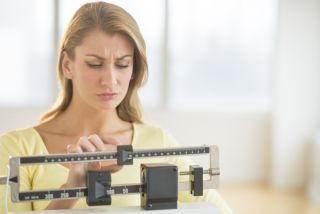An expert surveys the research and sets a guideline.
Posted Sep 17, 2015

Source: tmcphotos/Shutterstock
People who have been dieting may be uneasy checking to see if they’ve lost weight, especially if they think they’ve been "good," but then find the result disappointing. They may be reluctant to step on the scale again anytime soon, if only to avoid further disappointment.
(Normal dieting anxiety, of course, pales in comparison with the intense fear experienced by people with eating disorders. When I was working in a hospital eating-disorder program, I was frequently confronted with objections or flat-out refusals to be weighed. One young woman reluctantly agreed, but then stepped on the scale backwards so that she couldn’t see the result. In contrast binge eaters or bulimics would weigh themselves several times a day; a few weighing themselves before, during, and after a meal.)
If you’ve been dieting or are just generally weight-conscious, how often should you weigh yourself? It's a long-debated question in the field, and opinions on the optimal frequency vary.
Findings from the National Weight Control Registry found that, for adults in its sample, frequent self-weighing was one of the behaviors associated with successful weight control—defined as weight loss averaging 70 pounds and maintained for six years.
In contrast, other previous research has suggested that frequent weighing was associated with depression, body dissatisfaction, binge eating, and unhealthy weight-control behaviors, at least among college students and young adults. As a result, some experts suggest that frequent weighing in this population may contribute to eating disorders. For at-risk teens and young adults, the usual recommendation is to limit weighing to once per week.
In a new study of young adults age 18-35, researchers from several universities assessed frequency of weighing, use of healthy and unhealthy weight control strategies, symptoms of depression, and eating. Of the 600 participants, 11 percent weighed themselves daily, and more than a third weighed themselves at least several times a week. The researchers found that frequent weighing wasn’t associated with current BMI, but was helpful. Frequent weighing was associated with being further below one's highest previous weight; a greater use of healthy weight-control methods, and greater self-reported effort to control weight. In contrast to earlier studies, frequent weighing had no relationship to unhealthy weight-control methods, disordered eating, or depressive symptoms.
I agree with the conclusions of the authors of this study:
"Frequent self-weighing appears to be part of a constellation of healthy weight-control behaviors.”I encourage people who are trying to lose weight (and are not at high risk for an eating disorder) to weigh themselves daily. It’s usually best to weigh yourself the first thing in the morning, after getting out of bed. You can plot the result on a graph to track your progress. Use the findings to determine high-risk situations and times that contribute to unnecessary eating, and unhelpful habits that you can change.
Daily weighing can help prevent the slow, steady weight gain that is all-to-common among adults.
没有评论:
发表评论